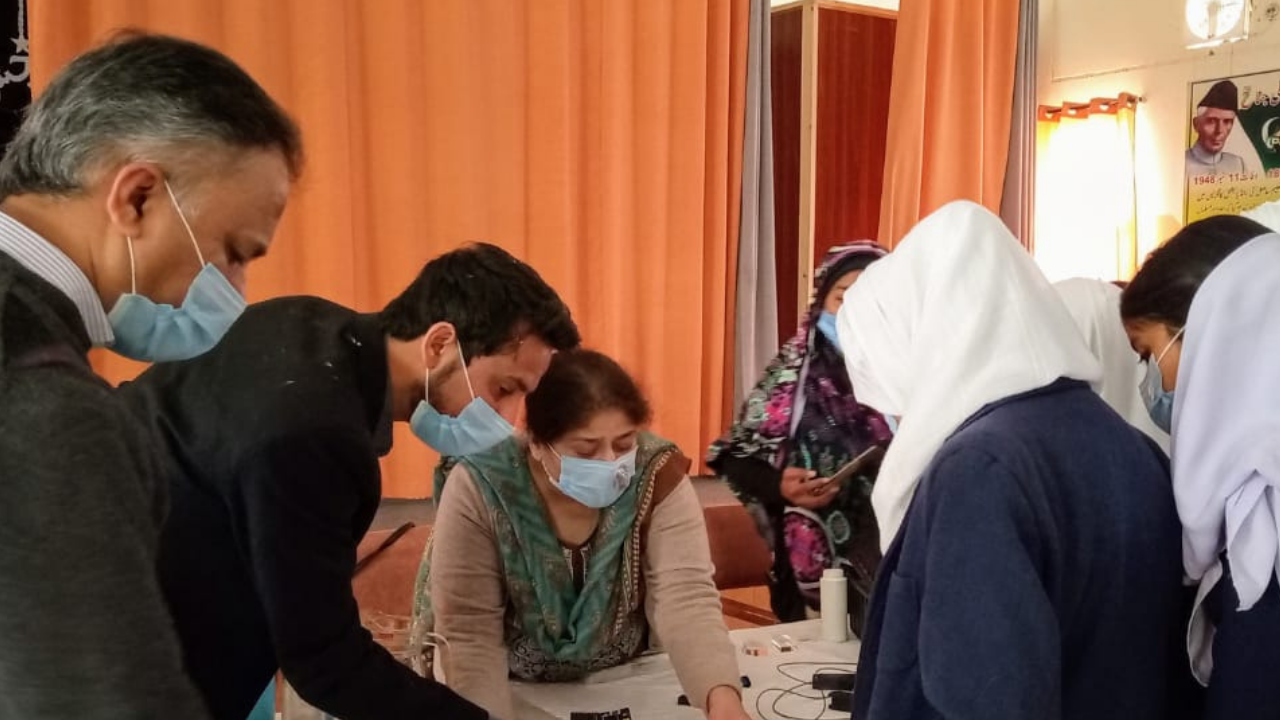
With ICTP's 60th anniversary coming up in 2024, there is now a wide network of ICTP alumni around the world. Former participants of programmes, activities, and networks of all career stages are working in a wide variety of scientific fields and in non-scientific positions. Recently, Dr. Imrana Ashraf, an ICTP Senior Associate from Pakistan, recognized the potential of this network, and became interested in strengthening these connections and gathering alumni together.
"I felt the need to gather our academia and help our younger generation, especially in developing countries like Pakistan, during present times," says Ashraf. Now an Affiliate and retired Associate Professor of Physics at Quaid-i-Azam University in Islamabad, Pakistan, she is closely familiar with ICTP and its networks. "I visited ICTP first time in 1988, to attend a winter activity on optics," says Ashraf. "Then over more than three decades, I visited ICTP as a student, as an Associate, as a tutor, as a TRIL fellow, and as a lecturer for the Winter Activity in Optics. I feel ICTP has a vital role in my professional life," she says.
Ashraf realized that the global pandemic was greatly impacting the social nature of science and collaboration. International travel restrictions contribute to isolating conditions for scientific communities. She was especially concerned about scientific communities in developing countries, where access to reliable internet and vaccines can both be uncertain. Known as an energetic scientist and mentor, Ashraf came up with the idea for and drove the launch of the Pak-ICTP Alumni Society (PIAS). It aims to "establish a vibrant ICTP alumni network," says Ashraf, "to nurture research collaborations, organize scientific outreach activities, provide career and vocational mentorship and help to develop active academic linkages between Pakistani and Italian educational institutes."
The response from ICTP alumni was enthusiastic, with Associates, Diploma Programme alumni, TRIL fellows, and visitors all joining. More than a hundred alumni made contact and signed up for PIAS membership. "The response of Pakistan–ICTP affiliates who are settled in Pakistan and abroad was positive and quick," says Ashraf. "They are enthusiastic to share their experiences with Pakistani students using the PIAS channel."
Now, Ashraf and a four-member founding team are planning a wide range of activities for the society’s scientific calendar. On the team are Dr. Joseph Niemela (Senior Research Scientist Emeritus, ICTP) as international scientific advisor, Dr. Raheel Ali (Quaid-i-Azam University, Islamabad), Dr. Jehan Akbar (Hazara University, Mansehra), Dr. Nigum Arshed (University of Education, Lahore) and Abdul Rahman (Quaid-i-Azam University, Islamabad). The new PIAS schedule includes summer schools, workshops, seminars and outreach activities, and Ashraf plans to work with ICTP affiliates, chosen as focal persons for PIAS, to organize short bilingual (Urdu- English) courses understandable for students from public sector secondary schools. All activities will be partially or fully online due to Covid-19, as well as streamed live via the society’s digital presence. Through streaming, thousands of participants from across Pakistan have attended the sessions organized so far.
"We are lucky that things are moving smoothly," says Ashraf, who has already organized several events since the inaugural session on 26 January 2021. Three days later, the society marked the birthday of ICTP founder and Pakistani Nobel Laureate Abdus Salam. "We started February with technical talk by Professor Vanderlei Salvador Bagnato (of the University of Sao Paulo, Brazil), and then we celebrated International Day of Women and Girls in Science on the 11th," says Ashraf. "Everything took its place accordingly so far."
The inaugural PIAS session included a message from ICTP Director Atish Dabholkar with congratulations to Ashraf on setting up PIAS in such a short time, while acknowledging the need for similar connection points to gather researchers. The Italian Ambassador in Pakistan, H.E Andreas Ferrarese, also welcomed the initiative.
A few days later, at the event celebrating Salam, Dr. Pervez Hoodbhoy talked about Salam’s journey from growing up as an outstanding student in rural Punjab, to his exceptional research at Cambridge as a graduate student, to winning the Nobel Prize in Physics. He highlighted Salam’s deep love and commitment to Pakistan and its scientific community, while Salam’s doctoral student Dr. Fayyazuddin highlighted Salam’s enthusiasm for promoting physics, as well as his significant contributions to develop the scientific and technological infrastructure in Pakistan.
Remembering Salam's energy and commitment is a bright note for the inauguration of PIAS, a group of energized alumni that is itself a ripple effect of Salam's work at ICTP and his passion for scientific capacity building. Ashraf knows the importance of this work and connecting with other scientists. "I am not ambitious about my own career," says founder Ashraf. "Rather, I believe in spreading knowledge to the underprivileged and helping them to come up too, slowly and steadily. PIAS aims to start small, lay a sound foundation, and build on it."
---- Kelsey Calhoun
















